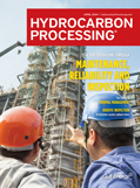Management
Business Trends: EPC 2030: Five vital characteristics that will define the EPC firm of tomorrow
The state of the global engineering, procurement and construction (EPC) industry can accurately be described as “challenging.” Operating in an environment of volatile, uncertain, complex and ambiguous conditions, EPC firms are facing unsustainable levels of stress.
Can ammonia be a future energy storage solution?
Ammonia is well known as a fertilizer. However, it is also a potential carbon-free fuel and an excellent solution for storage of renewable electricity, especially if the syngas needed for producing the ammonia is made by electrolysis.
Business Trends: The ins and outs of construction contracts
Industrial construction projects are becoming larger and more complex, with shorter schedules. To meet these challenging requirements, such construction projects are often executed by multiple entities located in different countries that may have different business objectives.
Digital: Better maintenance through better data
When I talk to professionals in the refining and petrochemical businesses, they are always interested in how new technologies can improve operational efficiency, make plants safer and increase profitability.
Executive Viewpoint: Succeeding against cyber attacks
No doubt exists that the added connectivity that modern control and automation systems deliver offers a myriad of benefits. By embedding computing within the process and utilizing edge and cloud technologies, it can provide greater visibility. It creates a digital thread for the plant and allows both equipment and the processes to be analyzed, as well as giving prescriptive advice.
Surviving turbulent times requires deep management changes
The Stone Age did not end due to a stone shortage. The Conventional Oil Age was not eclipsed by vanishing traditional oil and gas resources. The Shale Revolution unleashed an era of abundant, new unconventional oil and gas supplies.
Editorial Comment: Honoring the industry’s best … take 2!
Due to Tropical Storm Imelda, Hydrocarbon Processing issued its first force majeure in postponing the third annual HP Awards.
Improved cooling system performance begins with data
Refineries consume large amounts of energy and water to refine crude oil into products. Up to 10% of crude oil’s energy content is consumed during processing, and it takes 1.5 bbl of water to process one barrel of crude oil. Refining processes also generate large quantities of excess thermal energy that needs to be expelled into the environment using a once-through or recirculating cooling system.
Use submerged combustion systems to efficiently destroy hazardous plant waste
In the production of clean fuels, plastics and other hydrocarbon-based products, refineries and petrochemical facilities generate unwanted (waste) byproducts. Having no market value, the undesired byproducts must be recycled, minimized or eliminated. Depending on the feedstocks, end products and reactant materials, the unwanted materials can be gases, liquids or multiphase materials.
Hydrocarbon Processing Awards Winners
<i>Hydrocarbon Processing,</i> the downstream processing sector’s leading technical publication, has announced the winners for its third annual awards. The <i>HP</i> Awards celebrate innovative technologies and people that have been instrumental in improving facility operations over the past year.

- INEOS completes purchase of LyondellBasell's EO&D facility in Bayport, Texas (U.S.) 5/2
- HPLNG delays commissioning of Chhara LNG import terminal in India 5/2
- Shell records nearly $8-B Q1 profit on the back of refining, chemicals/products and LNG divisions 5/2
- Equinor selects Aker for Mongstad refinery upgrade project 5/1
- Australian researchers testing SAF production from landfill gases 5/1
- ACC responds to U.S. EPA's final risk management rule for methylene chloride 5/1




